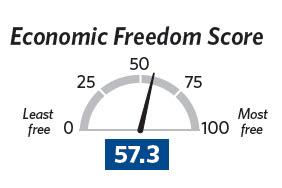 In the Wall Street Journal and Heritage Foundation yearly index of economic freedoms report for the 2012, Bosnia and Herzegovina has remained in 104 place, with an economic score of 57.3, which is 0.2 points lower than last year. One place above Bosnia and Herzegovina (103rd) occupies Kenya and one place below (105th) is Fiji. All of Bosnia and Herzegovina's neighbors have scored much better:
In the Wall Street Journal and Heritage Foundation yearly index of economic freedoms report for the 2012, Bosnia and Herzegovina has remained in 104 place, with an economic score of 57.3, which is 0.2 points lower than last year. One place above Bosnia and Herzegovina (103rd) occupies Kenya and one place below (105th) is Fiji. All of Bosnia and Herzegovina's neighbors have scored much better:

